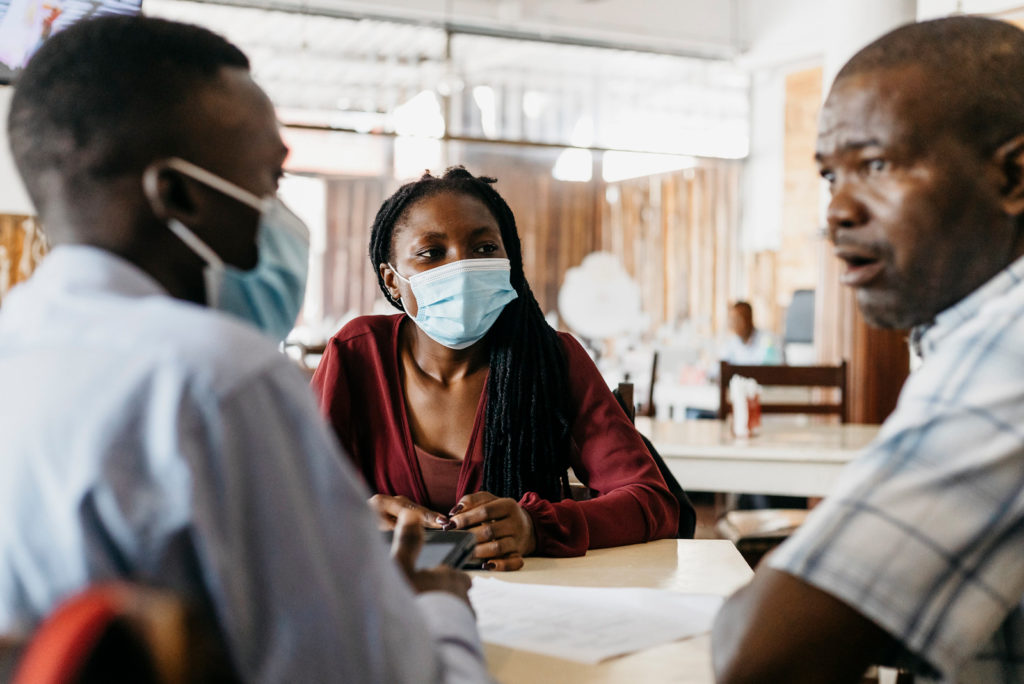Responding effectively to the Covid-19 crisis and in ways that address systemic inequalities in the longer term raises many challenges – and opportunities – for researchers and commissioners of research.

Launched in October 2020, the Covid Collective brought together the expertise of eight initial partner organisations coordinated by the Institute of Development Studies, and it currently involves 28 partners and supports 56 projects in 34 countries. The Covid Collective seeks to inform decision-making on some of the most pressing Covid-19-related development challenges, and to address emerging social science questions and needs arising in relation to the pandemic.
This issue of the IDS Bulletin draws on experiences from the social science research projects around the world supported by the Covid Collective and provides concrete examples of how researchers have demonstrated innovation and adaptation in a range of contexts. Important lessons have been learned about research processes and evolving technical approaches and methods in the areas around access and engagement; consent, ethics, and incentives; and power and perspectives.
This IDS Bulletin subsequently offers insights for research and provides potential directions for policy and decision-making around research prioritisation, funding, and support. It concludes that research supported by the Covid Collective is providing useful insights for ‘doing development research differently’, which in turn provides real hope for research to help transform knowledge and transform lives. Lessons will continue to be learned and, ultimately may also be an important contribution in ongoing efforts to the significant, critical agenda around decolonising development knowledge.
Read the articles in this issue
Introduction: Pandemic Perspectives – Doing Research Differently During Covid-19
Peter Taylor and Paul Knipe
Bangladesh and Covid-19: Reversals and Resilience
Atiya Rahman, Nusrat Jahan, Imran Matin and Hossain Zillur Rahman
Positioning Research for Impact: Lessons From a Funder During the Covid-19
Pandemic
Arjan de Haan and Emma Sanchez-Swaren
Livelihoods and Welfare Amidst Layered Crises in Afghanistan
Orzala Nemat, Vidya Diwakar, Ihsanullah Ghafoori and Shukria Azadmanesh
Covid-19 Vaccine Rollout: Challenges and Insights from Informal Settlements
Kate Lines, Junior Alves Sebbanja, Stanley Dzimadzi, Diana Mitlin, Patience Mudimu-Matsangaise, Vinodkumar Rao and Happiness Zidana
The Distances that the Covid-19 Pandemic Magnified: Research on Informality and the State
Susana Araujo, Wajahat Afzal, Deepta Chopra, Max Gallien, Umair Javed, Salman Khan, Shandana Khan Mohmand, Maha Noor Qureshi, Shafaq Sohail and Vanessa van den Boogaard
Adapting Disability Research Methods and Practices During the Covid-19 Pandemic: Experiences from the Field
Lena Morgon Banks, Samantha Willan, Gakeemah Inglis-Jassiem, Kristin Dunkle, John Ganle, Tom Shakespeare, Rifat Shahpar Khan, Shaffa Hameed, Mercilene Machisa, Nicholas Watson, Bradley Carpenter, Tracey Smythe, Nomfundo Mthethwa, Queen Seketi, Jane Wilbur, Ayanda Nzuza, Zeynep İlkkurşun, Shailaja Tetali, Lopita Huq, Amanda Clyde and Jill Hanass-Hancock
The Covid-19 Pandemic as an Opportunity for Leveraging Global South Research and Knowledge
Estefanía Charvet and Andrea Ordóñez
About the IDS Bulletin
The IDS Bulletin is an open access, peer-reviewed journal focusing on international development. In continual publication since 1968, it has a well-established reputation for intellectually rigorous articles developed through learning partnerships on emerging and evolving development challenges presented in an accessible manner in themed issues that bridge academic, practice and policy discourse.
It has become one of the leading journals in its field through engaged scholarship between academics, donors, non-governmental organisations and policy actors worldwide, bringing together cutting-edge thinking, research and debate from the Institute of Development Studies community and its partner organisations.
The IDS Bulletin aims to contribute to critical thinking on how transformations that reduce inequalities, accelerate sustainability and build more inclusive and secure societies can be realised.
